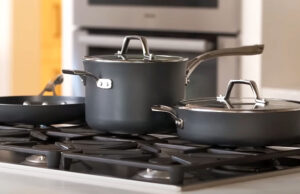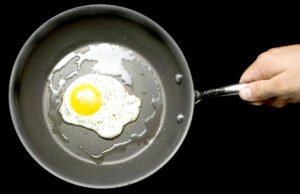As an Amazon Associate, I earn from qualifying purchases at no extra cost to you.
Can an Oven Explode? What You Need to Know!
Imagine you’re cooking dinner, and suddenly you hear a loud bang coming from the kitchen. You rush in, only to realize your oven has exploded! It sounds like something out of a movie, but can it really happen? In this article, we’ll dive deep into this scary thought and explore whether your oven can explode, why it might happen, and how you can prevent it from ever occurring. Grab a snack, and let’s explore this kitchen mystery together!
What Causes an Oven to Explode?
An oven explosion might sound like something that’s rarely possible, but there are a few reasons why it might happen. Understanding these reasons can help you avoid a dangerous situation. When we talk about an oven exploding, we’re usually talking about either a gas explosion or an electrical fire that causes a loud pop or blast. So, let’s dive into these two main causes and what could go wrong.
Gas Leaks and Oven Explosions
Gas ovens are common in many kitchens, but they come with a little bit more risk than electric ovens. Gas ovens rely on natural gas or propane to generate heat, and a small leak in the gas supply can lead to dangerous situations. If there is a gas leak inside your oven, the gas can build up in the air. If there’s an ignition source nearby, such as a spark from the oven’s igniter, it can cause the gas to ignite and explode.
It’s important to recognize the signs of a gas leak in your oven. If you smell gas near your oven, it’s essential to act fast. Here’s what you should do:
- Turn off the oven and any gas supply valves immediately.
- Don’t turn on any lights or electrical switches that might spark.
- Open windows and doors to ventilate the area.
- If you still smell gas, evacuate the house and call your local gas company or emergency services.
To prevent gas leaks, always ensure that your oven is professionally installed and regularly maintained. Gas lines can deteriorate over time, and a leak can occur if the lines are damaged or not properly connected.
Faulty Wiring and Electrical Explosions
Another potential cause of oven explosions is electrical malfunction. If the wiring in your oven is old, damaged, or improperly installed, it can create a risk for sparks and fires. These sparks might ignite nearby flammable materials or cause a small electrical explosion. However, this is less common than gas-related explosions.
To avoid this, make sure to have your oven inspected if it starts to behave strangely—like flickering lights, sparking, or strange smells. Here’s what you can do to prevent electrical issues:
- Have a licensed electrician inspect your oven and wiring regularly.
- Replace any faulty or frayed cords immediately.
- Ensure that your oven is plugged into a properly grounded outlet.
Even though electrical explosions are rarer than gas explosions, they can still be dangerous, so it’s essential to keep your oven in good working order.
Malfunctions in the Oven’s Self-Cleaning Feature
If your oven has a self-cleaning feature, you might wonder how it can contribute to an explosion. The self-cleaning cycle involves extremely high temperatures to burn off food debris. If the oven is used improperly or is too old, the high heat can cause a buildup of grease or other flammable materials inside the oven, leading to a fire or explosion.
To avoid issues with the self-cleaning feature:
- Never leave your oven unattended during the self-cleaning cycle.
- Clean your oven regularly to remove any leftover grease or food debris before using the self-cleaning mode.
- Make sure to follow the manufacturer’s instructions when using the self-cleaning feature.
In rare cases, parts of the oven’s heating element or insulation could also malfunction, adding to the risk. But, if maintained properly, self-cleaning ovens are generally safe to use.
Overheating and Explosions
Overheating is another cause that could lead to an oven explosion. When your oven gets too hot, especially due to a malfunctioning thermostat or heating element, it can cause parts of the oven to break down. These parts might overheat and catch fire, or in extreme cases, cause a sudden explosion.
To avoid this:
- Make sure the oven’s thermostat is working correctly. A faulty thermostat can cause the oven to heat up beyond the safe limits.
- Don’t ignore unusual heat from your oven. If it gets excessively hot, it’s time to get it checked.
- Avoid overcrowding your oven. When too many items are placed inside, it can disrupt air circulation, causing overheating.
By taking care of your oven, you can avoid overheating issues and the risk of an explosion.
How to Prevent Your Oven from Exploding
The good news is that there are many steps you can take to ensure your oven stays safe and doesn’t explode. Regular maintenance and careful usage are key to preventing any mishaps. Let’s go over the most important tips to keep your oven working safely.
Regular Maintenance and Inspection
The first and most important step in preventing oven explosions is regular maintenance. No matter what type of oven you have, it’s essential to have it inspected periodically. For gas ovens, check the gas lines and connections to ensure there are no leaks. For electrical ovens, ensure that the wiring is in good condition. If you’re unsure how to inspect these yourself, hire a professional technician to do it for you.
In addition to gas and electrical checks, always make sure the oven’s parts are clean and functioning correctly. If you notice any damage, such as broken knobs or burnt-out light bulbs, have them replaced as soon as possible.
Proper Installation and Use
Installing your oven properly is crucial to prevent future issues. Whether you’re installing it yourself or hiring a professional, make sure the oven is set up according to the manufacturer’s instructions. Incorrect installation can lead to faulty connections, which might cause gas leaks or electrical issues.
If you’re using a self-cleaning oven, it’s essential to follow the instructions carefully. Self-cleaning ovens can reach temperatures as high as 900°F, which is significantly higher than regular cooking temperatures. If used improperly, this can lead to damage or fires. Always stay close when running a self-cleaning cycle, and make sure the oven door is securely locked.
Know How to Handle a Gas Leak
If you have a gas oven, being able to recognize and react to a gas leak is crucial. A gas leak can quickly turn dangerous, and knowing what to do can make a big difference. Always remember these important tips:
- Never ignore the smell of gas. If you notice it, act quickly and calmly.
- Always check the oven’s gas line and connections regularly for any signs of damage or wear.
- If the smell is strong, leave the area immediately and call for help.
Never try to fix a gas leak yourself unless you’re a trained professional.
Avoid Overloading the Oven
It can be tempting to cram as much food as possible into your oven, especially during the holidays or when you’re cooking for a large group. But overcrowding your oven can prevent it from heating properly and increase the risk of overheating. It’s best to follow the recommended guidelines for how much food your oven can handle at once.
Also, avoid placing anything flammable, like paper towels or dishcloths, near the oven. Even small items can catch fire if they get too close to the heating elements.
Use the Oven According to the Manufacturer’s Instructions
Each oven comes with specific instructions on how to use it properly. Following these guidelines not only ensures that you’re using your oven safely, but it also helps extend its life. Always read through your oven’s manual carefully, especially if you’re unsure how to use certain features like self-cleaning or the convection fan. By doing this, you’ll avoid any potential risks and keep your oven in top condition.
Final Thoughts
I hope this article helped you understand why ovens can explode and how you can prevent such incidents. Regular maintenance, proper installation, and safe usage are the keys to keeping your oven safe and functioning well. So, don’t let the fear of an oven explosion spoil your cooking—take action to keep your kitchen safe!
Frequently Asked Questions
Is it safe to use a gas oven with a slight gas smell?
If you notice even a slight gas smell, it’s not safe to use your oven. Immediately turn it off and ventilate the area. Contact a professional to inspect the gas line.
Can an oven explode from too much grease inside?
Yes, an oven can catch fire or explode if there is a buildup of grease. Always clean your oven regularly and avoid using the self-cleaning feature if it’s greasy.
Do I need to replace the gas line in my oven?
Yes, gas lines can wear out over time. If you notice any leaks or damage, have a professional replace the gas line immediately to avoid a potential explosion.
Is it possible for an oven to catch fire during the self-cleaning cycle?
Yes, during the self-cleaning cycle, ovens reach very high temperatures. If there’s too much grease or debris inside, it could catch fire. Always clean your oven beforehand.
Can an electrical oven explode?
Electrical ovens are less likely to explode than gas ovens. However, faulty wiring or electrical malfunctions can cause sparks or fires. Regularly inspect your oven’s wiring.
Do I need professional help for gas oven maintenance?
Yes, if you have a gas oven, it’s important to have a professional inspect and maintain the oven regularly to avoid gas leaks and ensure safety.
Is it safe to leave my oven on while I’m not home?
It’s not safe to leave your oven on when you’re not at home. Ovens should be monitored while in use to prevent overheating, gas leaks, or other issues.
Can overloading the oven cause it to explode?
Overloading the oven can cause overheating and damage, but it’s not likely to cause an explosion. However, it can create unsafe conditions and risk a fire.




